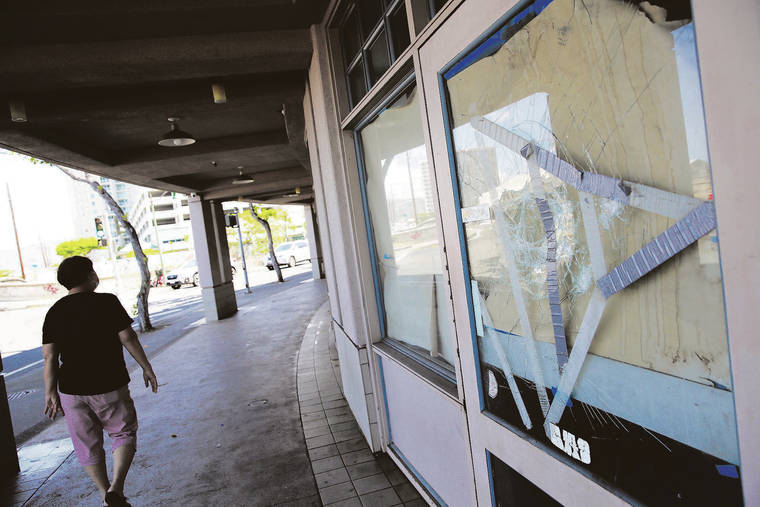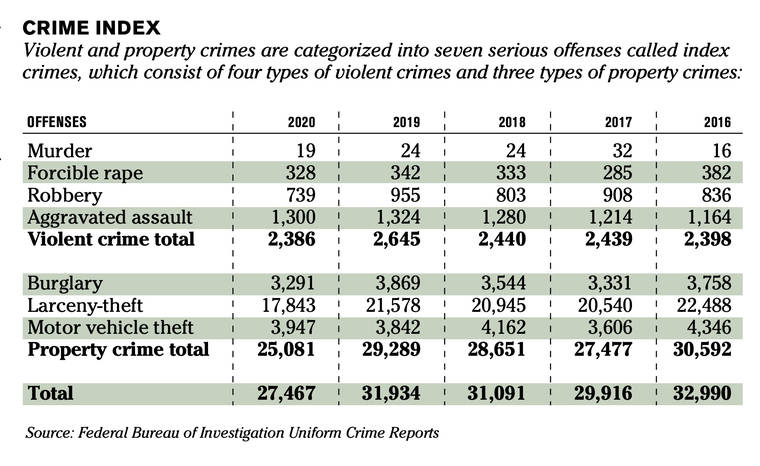Crime falls during pandemic but Honolulu police, officials expect a surge as restrictions continue to ease

JAMM AQUINO / JAQUINO@STARADVERTISER.COM
Chinatown has been designated as a Weed and Seed community in an attempt to reduce crime in the area. Community member Chu Lan Shubert-Kwock walked past a shattered window of a shuttered business along River Street last month.



Crime in the time of COVID-19 Opens in a new tab decreased in nearly every category last year, but police, prosecutors and other officials worry about the use of weapons and a possible surge in crime as visitor numbers increase and COVID-19 restrictions ease.
There were 27,467 index crimes in Honolulu in 2020, the lowest in five years — compared to 31,934 in 2019; 31,091 in 2018; 29,916 in 2017; and 32,990 in 2016, according to the Honolulu Police Department’s annual report.
Index crimes are murder, rape, robbery, assault, burglary, theft and car theft and are tracked nationally by the FBI and U.S. Department of Justice. The use of firearms in crimes declined for murder and robbery but rose for assault. The use of knives or cutting instruments in all three categories increased from 2019 to 2020.
“The decrease in crime during the pandemic is probably due to several factors,” HPD interim Chief Rade K. Vanic told the Honolulu Star-Advertiser. “Many crimes, such as street robberies and thefts, are typically crimes of opportunity. During the emergency order, the beaches and parks were closed and few people were traveling and shopping. People were spending more time at home. With fewer calls for service, the officers’ time was shifted to COVID-related enforcement.”
The public’s attitude toward police is mostly positive, according to a recent survey, with 43% of respondents saying HPD is responsive to concerns of community members and 34% saying the department is somewhat responsive, according to a SMS research poll conducted May 18 to 26. Residents feel most positive that HPD “treats people fairly” is “respectful” and “trustworthy,” according to the survey.
Mayor Rick Blangiardi said the public’s compliance with COVID-19 restrictions during the pandemic is further proof of how residents across the state protect one another.
Don't miss out on what's happening!
Stay in touch with breaking news, as it happens, conveniently in your email inbox. It's FREE!
“It is encouraging that the annual report shows robberies, burglaries, larceny-theft, property crime and violent crimes here in the City and County of Honolulu were all down to their lowest numbers in five years,” Blangiardi said. “During the especially challenging year of 2020, the Honolulu Police Department remained steadfast in its commitment to our community and residents. It was just last year we lost two members of our HPD ohana, Officer Kaulike Kalama and Officer Tiffany Enriquez, who were killed in the line of duty. I stand by the men and women who protect our community and wholeheartedly support our police department. As our economy continues to open up and local people and visitors get back to their routines, the goal of this administration is to support the Honolulu Police Department in keeping Honolulu one of the safest large cities in the nation.”
With Honolulu reopening, Prosecuting Attorney Steven S. Alm worries about a possible increase violent crimes such as assaults, domestic violence and sex trafficking. COVID-19 emergency orders brought the judiciary to a halt, creating an “enormous” backlog of cases, he said. During the most severe lockdowns, prosecutors continued to develop cases and work with HPD to charge suspects.
“As more and more people go out into public, we expect to see an increase in violent crime, including crimes involving the use of firearms and knives,” Alm said. “Likewise, the resurgence of tourism will likely bring an increase in the number of people, both children and adults, who are trafficked into Hawaii from out of state. We are fortunate to have a very good working relationship with the Honolulu Police Department and together we will meet these challenges head-on to protect the people of Honolulu. We are working with HPD to identify and prioritize ‘hot spots’ of crime to target and are also getting ready to start the Weed and Seed initiative in the Chinatown and Kalihi-Palama neighborhoods. In addition to reducing crime there, we are also partnering with the mental health and drug and alcohol treatment programs to work with the increased homeless population in these neighborhoods.”
Weed and Seed areas pair people with resources to reduce crime through law enforcement, community engagement, social and economic revitalization, neighborhood beautification and an investment in programs that benefit the children in the area. There are three designated Weed and Seed Hawaii communities on Oahu: Kalihi-Palama-Chinatown-Ala Moana-Sheridan, Waipahu and Ewa-Ewa Beach.
Police patrol District 1, which covers downtown Honolulu and the Makiki area, saw the highest amount of crime in 2020, with 6,642 reported offenses, 35% of which were thefts. Patrol District 5, which includes Kalihi, Palama and parts of Moanalua, had 5,235 crimes, 45% of which were thefts.
Community concerns
City Councilwoman Carol Fukunaga, who represents downtown, said business disruptions associated with COVID-19 shutdowns were heightened by increased numbers of homeless congregating in areas where drugs or alcohol were easy to obtain, or where unemployment, desperation and loss of housing contributed to increases in thefts, shoplifting and similar crimes. City agencies also were hard-pressed to keep up with sanitation and public safety complaints about daily conditions along city streets and public spaces, she said.
“On one hand, most retail, food service and small businesses in downtown and Chinatown were closed during the early part of 2020, so there may have been a corresponding drop in crime,” Fukunaga said. “However by fall 2020, I received escalating numbers of complaints about vandalism, homeless break-ins, property damages to Chinatown storefronts or purse-snatchings from elderly citizens. So we responded to two or three times more complaints about crime than we did before. It was a very challenging year for District 6 neighborhoods like Downtown-Chinatown, Nuuanu-Liliha, Kaka‘ako and Makiki/Makiki Heights — which was shown by the higher-than-normal theft, burglary and other crime stats in 2020. My staff and I submitted hundreds of requests for city services regarding complaints about attempted break-ins, homeless encroachments, thefts, burglaries and drug-dealing.”
The City Council added $250,000 to the city’s operating budget to support the Prosecutor’s Weed and Seed initiative, she said.
City Councilwoman Radiant Cordero, whose district includes Kalihi, said the high amount of theft in the area is related to major transportation arteries converging in her district, allowing thieves easy access to homes that are often empty while people work.
“Crime in our community is also just as much of a public health issue, as it is a public safety issue, and is truly systemic,” Cordero said. “All levels of government need to give solutions to provide strengths of skills or opportunities to allow communities to support themselves no matter their education level or what language they speak. That’s why community programs, community policing and creating spaces and opportunities from youth to senior programs, trade programs, sports and places for activities, and even saving places like Palama Settlement is so key for crime prevention, but especially because it takes the focus away from seeing Kalihi and Chinatown as ‘bad parts of town’ to then places to invest in for opportunities for everyone.”
There are typically 25 to 30 illegal gambling parlors operating in her district, attracting a transient crowd from outside the community, along with illegal drug use and other bad behavior.
“People know about this,” she said. “But because people have to resort to illegal gaming for extra cash or letting off steam, that’s what the demand is apparently. It creates another type of transient community that is unwanted. I would like to see things like that change.”
Heidi Tsuneyoshi, chairwoman of the City Council’s Public Safety Committee, said police face unprecedented challenges and need community support and partnerships. Putting more officers, visibly, into communities, restarting neighborhood watches and community policing programs are critical to empowering citizens to look out for one another while supporting law enforcement efforts to keep them safe.
“We have to focus on supporting … each other at every level,” Tsuneyoshi said. “I agree with interim Chief Vanic. We need to get boots on the ground and get back to community policing and neighborhood watches to make sure we focus attention on what’s going on so we can see any spikes or increases in real time.”
Vigilance urged
With Honolulu in Tier 4 and residents enjoying the fewest government-mandated limits in more than a year, police are seeing increased calls for service while people head back to beaches, scenic spots and summer parties. Police are urging residents to be vigilant and take precautions.
“Now that the economy is opening up and people are getting back to a pre-pandemic routine, I suggest making sure that everyone’s house and car doors are always locked, windows closed or rolled up, and never leave anything of any value at all in view. … Put it in the trunk or back in the house,” said Nicholas Schlapak, a patrol officer and Honolulu chapter chair of the State of Hawaii Organization of Police Officers union. “Invest in a good home surveillance or alarm/security system. Make sure your car keys are accounted for at all times. Buy a good home safe, one that can be secured to a wall or the floor. Watch your surroundings when walking in public and pay attention to what’s going on around you. Don’t bury your nose in your smartphone or tablet. Keep an eye out on your neighbor’s property and family as well and I am sure they will do the same for you.”




